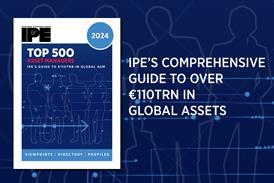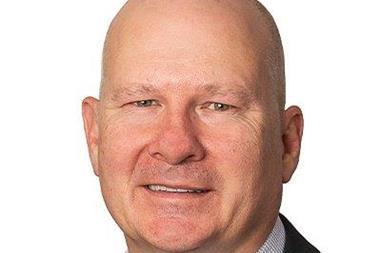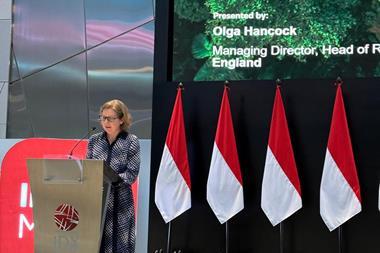European asset owners should seize the US retreat from ESG as a moment to evaluate and recalibrate their manager mandates, argues Colin Melvin
The US asset management landscape is rapidly transforming, with a re-evaluation of investment priorities shaped by political pressure and regulatory change. For European asset owners with deeply embedded sustainability principles who are accustomed to a more orderly discourse, this brings both uncertainty and a rare opportunity to achieve strategic clarity, provided they are willing to look beyond the short-term chaos.
What is unfolding is useful for filtering and focusing on what matters most. Asset managers with a coherent, long-standing commitment to stewardship and an understanding of sustainability risk are more clearly distinguishable from those whose earlier enthusiasm owed more to marketing strategy and compliance than conviction.
European asset owners can use this moment to reinforce their core values and clearly prioritise material risks and long-term outcomes, providing leadership and stability to directionless markets and dislocated corporations.
The American dislocation
The transatlantic divergence in asset management practice has never felt starker. ESG – an acronym that once enjoyed broad support – has become toxic in the US. Finding legitimacy and popularity in responding to greenwash and overreach, political actors have succeeded in turning ESG into a proxy for broader cultural disputes. This has produced the curious sight of fiduciaries contorting themselves to prove (or disprove) that the consideration of material non-financial risk is somehow un-American.
This follows over a decade of near-consensus, during which ‘ESG’ morphed from investment shorthand for integrating long-term risks to a catchall synonym for sustainability and CSR. Finding widespread momentum and emerging as a mainstream corporate and investment priority, ESG became associated with asset management strategies and reporting, net zero targets, diversity initiatives, and the enthusiastic branding of investment products, prompting a complex edifice of EU regulation.
For those allocating capital, this is not a moment for passivity
Colin Melvin, founder and managing director of Arkadiko Partners
However, by 2025, attacks on ESG (and sustainability more broadly) in the US had cast a shadow across the globe, with many multinational corporations removing it and associated terminology from communications, rebranding and seemingly scaling back related activities under direct or implicit legal and regulatory threat.
The underlying business and investment risks and opportunities associated with sustainability have not gone away – but they have become harder to talk about, including climate-related disruption of global supply chains, financial and reputational implications of exposure to human rights violations and low employee well-being and satisfaction impacting corporate culture and the ability to attract, retain and motivate staff.
Yet even as some US state legislatures seek to ban ESG consideration and limit the exercise of shareholder oversight, global regulators push for enhanced climate disclosures and anti-greenwashing enforcement. The industry, caught between these countervailing currents and divergent client demands, is responding in familiar ways: some asset managers hedge, a few stand firm and most retreat.
European investors might be forgiven for watching this unfold with a mix of bewilderment and unease. But the more astute will recognise the opportunity for recalibration, in a marketplace where ambiguity reigned.
A time for sharpened judgement
For those allocating capital, this is not a moment for passivity. It is a moment for discernment and leadership. The political polarisation in the US has created a sharper lens through which to evaluate asset managers. It has clarified the difference between those who see sustainability and stewardship as a substantive risk framework and therefore an integral aspect of asset management and those who treated them as little more than a marketing opportunity or regulatory irritant.
The lesson here is not that sustainability and stewardship within investment have failed, but that their implementation was too often superficial and undertaken as a separate task. Indeed, several asset managers had effectively set up mini-NGOs within their organisations, discouraging their portfolio managers from seeing sustainability and stewardship as core to investment practice. The scrutiny now being applied – albeit from unhelpful quarters – is exposing such inconsistencies that long needed correcting. This is to the benefit of long-term investors.
European asset owners and managers, whilst struggling under the weight of EU sustainable finance regulations, understand the materiality of environmental, social and governance risk and the implications of long-horizon investment. They know that governance failures, environmental degradation and social instability can impact investment returns over multiple quarters and decades.
What is required now is a thorough review of manager relationships. Mandates must be scrutinised and amended for alignment, coherence and substance. Stewardship and engagement should extend beyond marketing gloss to the granular: exercising shareholder rights, mitigating material risks, promoting good corporate governance, focusing on what matters most to the beneficiaries and providers of capital. The question is no longer who offers stewardship and addresses sustainability, but who has truly internalised it.
Managing the mandate: raising the bar
There is, of course, a danger of hubris in pointing fingers across the Atlantic. Europe has its own inconsistencies and excesses in stewardship and sustainability, not least ad hoc exclusions, a separate and misguided category of ‘ESG-engagement’ and fuzzy thinking around impact, particularly in public markets investments. The exclusion and rushed re-inclusion of weapons manufacturers is a case in point. But Europe’s asset owners are nonetheless well-positioned to engage with their managers on material risks and long-term outcomes and lead from the centre.
This means rethinking how mandates are structured and updating evaluation frameworks to go beyond surface-level commitments, recognising sustainability and stewardship as part of investment practice and decision-making rather than treating these as separate requirements.
“Asset owners should resist the temptation to moralise”
Asset owners should resist the temptation to moralise. The point is not to export European sensibilities, but to insist on investment discipline. Sustainability and stewardship are not about virtue; they are about value. And where managers shrink from that discipline in favour of political expediency, European capital may walk.
In addition, asset owners should continue to collaborate across borders. There is an urgent need for collective engagement on shared challenges – from climate risk to human capital management to voting transparency. European investors can help to strengthen coalitions and support the advancement of credible global standards.
Collective engagement – across markets and asset owner coalitions – can also help to reinforce expectations and reduce the compliance theatre that too often substitutes for real action. It is sometimes said that markets follow rather than lead, but standards are set as much by what capital tolerates as by what it demands.
The fiduciary frame revisited
One of the more damaging developments in the US discourse has been the framing of sustainability and stewardship as somehow incompatible with fiduciary duty. This is a fundamental misreading. Core to an understanding of fiduciary duty within institutional investment is a responsibility to manage long-term risk. To ignore climate exposure or governance frailty is not a brave stance against political correctness; it is a derogation of professional obligations.
European investors should not be drawn into false equivalencies. There is a perfectly reasonable debate to be had about how sustainability should be addressed, what matters most and how engagement is prioritised. But there is no credible case for ignoring the issue altogether. The world is warming, labour markets are shifting, and regulatory tides are rising. These are not opinions. They are facts that prudent investors must weigh.
The case for quiet leadership
Amidst the haze of performative politics, there is something to be said for quiet competence. European asset owners do not need to shout. But they do need to act. They must demand more from their managers, speak with clarity of their expectations, and support those who stay the course.
The American debate will continue. It may or may not become more rational. But European capital can still serve as ballast – anchored not in partisan impulse, but in the practical duties of long-term fiduciary stewardship. In times like these, that is a form of leadership that markets and corporations sorely need.
Colin Melvin is founder and managing director of Arkadiko Partners




















No comments yet